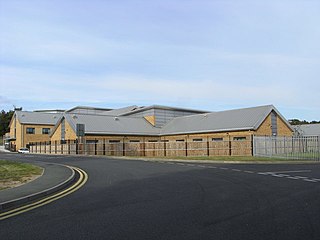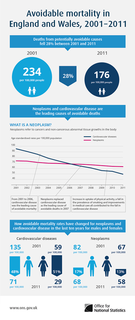
Since 1 April 1996, Wales has been divided into 22 single-tier principal areas, styled as counties or county boroughs for local government purposes. The elected councils of these areas are responsible for the provision of all local government services, including education, social work, environmental protection, and most highways. Below these there are also elected community councils to which responsibility for specific aspects of the application of local policy may be devolved. The last set of local elections in Wales took place in 2017, with the next due to take place in 2022.

The Department of Health and Social Care (DHSC) is the UK government department responsible for government policy on health and adult social care matters in England, along with a few elements of the same matters which are not otherwise devolved to the Scottish Government, Welsh Government or Northern Ireland Executive. It oversees the English National Health Service (NHS). The department is led by the Secretary of State for Health and Social Care with three Ministers of State and three Parliamentary Under-Secretaries of State.

The Metropolitan Borough of Walsall is a metropolitan borough in the West Midlands, England. It is named after its largest settlement, Walsall, but covers a larger area which also includes Aldridge, Bloxwich, Brownhills, Darlaston, Pelsall and Willenhall. It also serves as the post town for nearby Cannock Chase District and Lichfield District respectively.
Health visitors are professional individuals engaged in public health work within the domestic setting, predominantly found in countries with state-funded health systems. They are distinct from district nurses, who provide clinical healthcare, domestically.

A mental health trust provides health and social care services for people with mental health disorders in England.

NHS Wales is the publicly funded healthcare system in Wales, and one of the four systems which make up the National Health Service in the United Kingdom.

NHS Scotland, sometimes styled NHSScotland, is the publicly funded healthcare system in Scotland, and one of the four systems which make up the National Health Service in the United Kingdom. It operates fourteen territorial NHS boards across Scotland, seven special non-geographic health boards and NHS Health Scotland.
Health and Social Care (HSC) is the publicly funded healthcare system in Northern Ireland. Although having been created separately to the National Health Service (NHS), it is nonetheless considered a part of the overall national health service in the United Kingdom. The Northern Ireland Executive through its Department of Health is responsible for its funding, while the Public Health Agency is the executive agency responsible for the provision of public health and social care services across Northern Ireland. It is free of charge to all citizens of Northern Ireland and the rest of the United Kingdom.
The Health and Social Care Select Committee is a Departmental Select Committee of the British House of Commons, the lower house of the United Kingdom Parliament. It oversees the operations of the Department of Health and Social Care (DHSC) and its associated 29 agencies and public bodies. The Clerks of the Committee are Previn Desai and Joanna Dodd.
Healthcare in the United Kingdom is a devolved matter, with England, Northern Ireland, Scotland and Wales each having their own systems of publicly funded healthcare, funded by and accountable to separate governments and parliaments, together with smaller private sector and voluntary provision. As a result of each country having different policies and priorities, a variety of differences now exist between these systems.

The National Health Service (NHS) is the publicly funded healthcare system in England, and one of the four National Health Service systems in the United Kingdom. It is the second largest single-payer healthcare system in the world after the Brazilian Sistema Único de Saúde. Primarily funded by the government from general taxation, and overseen by the Department of Health and Social Care, the NHS provides healthcare to all legal English residents and residents from other regions of the UK, with most services free at the point of use for most people. The NHS also conducts research through the National Institute for Health Research (NIHR).

Healthcare in Wales is mainly provided by the Welsh public health service, NHS Wales. NHS Wales provides healthcare to all permanent residents that is free at the point of need and paid for from general taxation. Health is a matter that is devolved, and considerable differences are now developing between the public healthcare systems in the different countries of the United Kingdom, collectively the National Health Service (NHS). Though the public system dominates healthcare provision, private health care and a wide variety of alternative and complementary treatments are available for those willing to pay.
Healthcare in Finland consists of a highly decentralized three-level publicly funded healthcare system and a much smaller private sector. Although the Ministry of Social Affairs and Health has the highest decision-making authority, the municipalities are responsible for providing healthcare to their residents.

A census of the population of the United Kingdom is taken every ten years. The 2011 census was held in all countries of the UK on 27 March 2011. It was the first UK census which could be completed online via the Internet. The Office for National Statistics (ONS) is responsible for the census in England and Wales, the General Register Office for Scotland (GROS) is responsible for the census in Scotland, and the Northern Ireland Statistics and Research Agency (NISRA) is responsible for the census in Northern Ireland.
Following the 2010 United Kingdom general election, the UK Government announced plans to curb public spending through the abolition of a large number of quasi-autonomous non-governmental organisations (quangos). On 23 May 2010, Chancellor of the Exchequer George Osborne unveiled a £500million plan to reduce the budget deficit by abolishing or merging many quangos. This was styled in the national press as a "bonfire of the quangos", making reference to Girolamo Savonarola's religiously inspired Bonfire of the Vanities. The cuts and closures received criticism in some quarters, but was generally welcomed by the business community.

The Health and Social Care Act 2012 is an act of the Parliament of the United Kingdom. It provides for the most extensive reorganisation of the structure of the National Health Service in England to date. It removed responsibility for the health of citizens from the Secretary of State for Health, which the post had carried since the inception of the NHS in 1948. It abolished primary care trusts (PCTs) and strategic health authorities (SHAs) and transferred between £60 billion and £80 billion of "commissioning", or healthcare funds, from the abolished PCTs to several hundred clinical commissioning groups, partly run by the general practitioners (GPs) in England but also a major point of access for private service providers. A new executive agency of the Department of Health, Public Health England, was established under the act on 1 April 2013.
Healthcare in London, which consumes about a fifth of the NHS budget in England, is in many respects distinct from that in the rest of the United Kingdom, or England.
Healthcare in Greater Manchester is mainly provided by the Greater Manchester element of England's public health service, the National Health Service (NHS). This care is provided to all permanent residents of the United Kingdom, free at the point of use and paid for from general taxation from a variety of hospitals, clinics and other public care settings, with private and voluntary services operating and funded independently. The “Greater Manchester Model” of NHS health care is a system uniquely devolved within England, by way of close integration with the Greater Manchester Combined Authority and local authorities, with a vision led by the Mayor of Greater Manchester.
Healthcare in the West Midlands is now the responsibility of five clinical commissioning groups (CCG): Birmingham and Solihull; Sandwell and West Birmingham; Dudley; Wolverhampton; and Walsall.











